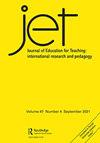教师知识的发展:广度、深度和细节
IF 1.7
3区 教育学
Q2 EDUCATION & EDUCATIONAL RESEARCH
引用次数: 0
摘要
数学概念可能是由博物馆展品提供的,尽管他们很乐意欣赏这些资源对加强数学课程的价值。第二篇论文由日本名古屋大学和瑞士洛桑教师教育大学的Shirley Tan及其同事发表在《教育教学杂志》2023年第49卷第1期。4,545 - 550 https://doi.org/10.1080/02607476.2023.2245219©2023 Informa UK Limited,以Taylor & Francis Group的名义交易,专注于“bansho”的使用,这是一种在日本用于数学教学的教学策略。“板书”一词的意思是“板书”,老师用板书记录整节课的流程,这样学生就可以看到所教授的各种观点的联系和进展,以及他们的说明性例子,从而组织他们的思维并产生新的想法。本文强调了板书的多重表征的价值,这与舒尔曼关于表征是教师知识转化为可学形式的关键组成部分的主张显然是一致的。接下来的两篇文章将从更广泛的角度探讨教师如何在其学科范围内增加和深化知识。来自美国马萨诸塞州圣十字学院的Lauren capototo和Kristina Reardon研究了学生教师如何理解学科素养的概念。学科素养是一种能力,使学习者能够以特定学科专家的身份阅读、写作、谈论、倾听和进行概念性和批判性思考。这项对教学的实质性和句法性内容知识的研究的一个重要发现是,学生教师认为跨一系列学科的读写技能和实践是离散的,他们通过推理获得这些技能和实践。第二篇在学术领域讨论PCK问题的文章是由西班牙巴塞罗那大学和美国加州圣何塞州立大学的Merce Garcia-Mila及其同事撰写的。他们调查了学生教师对学科内论证技巧显性教学的看法。研究发现,虽然实习教师认识到学习辩论和通过辩论来学习的价值,但他们不太热衷于利用课堂时间来实践这一点。有趣的是,各学科之间的意见分歧并不大。一门学科的文化适应始于早期的教育阶段,只有当人们开始思考一门学科的可教性时,学科规范和价值观才会被批判性地看待。舒尔曼认为,学科的实质性和句法组成部分(至少是那些经常出现在学校课程中的部分)是教学周期的起点和终点:通过教授一些东西,人们会学到更多。这被认为是教师学习的上升螺旋,即随着教学周期的每一次转变,教师的理解水平都会提高(la Velle和Newman 2021, 41)。Shulman的PCK范式的一个重要副产品是20世纪90年代以来在课堂上越来越多地使用信息和通信技术(参见Baggott la Velle, Watson, and Nichol 2000;Baggott and Wright 1995,1996a, 1996b, 1997)。Mishra和Koehler(2006)制定了TPACK模型(技术、教学和内容知识)来描述将技术成功整合到教与学中所需的知识种类。有大量证据表明,基于计算机的模拟可以加强初始教师教育,特别是在有争议或保密的情况下(例如McGarr 2020)。下一篇论文由Jesús PazAlbo和西班牙马德里胡安卡洛斯国王大学以及美国芝加哥州长早期儿童发展办公室的同事撰写,他们描述了一项利用父母、家庭和社区参与教育的模拟研究。来自西班牙和美国的实习教师参与了模拟并完成了一份在线调查。在这两个国家的背景下,实习教师对促进家庭参与的方式的理解有所提高,对教师培养与家庭积极关系的策略的了解也有所提高。这两篇文章都是社论本文章由计算机程序翻译,如有差异,请以英文原文为准。
Development of teachers’ knowledge: the breadth, depth, and detail
mathematical concepts potentially afforded by the museum exhibits, although they readily appreciated the value of the resources for enhancing mathematics lessons. The second paper, by Shirley Tan and colleagues from Nagoya University in Japan and Lausanne University of Teacher Education in Switzerland, JOURNAL OF EDUCATION FOR TEACHING 2023, VOL. 49, NO. 4, 545–550 https://doi.org/10.1080/02607476.2023.2245219 © 2023 Informa UK Limited, trading as Taylor & Francis Group focusses on the use of ‘bansho’, a pedagogic strategy used in Japan for mathematics teaching. The word bansho means ‘board writing’ and the teacher uses the board to record the flow of the entire lesson, so that learners can see the connections and progression of the various ideas being taught and their illustrative examples, to organise their thinking and to develop new ideas. This paper emphasises the value of bansho for making multiple representations, which clearly resonates with Shulman’s assertion of representation as a key component of the transformation of teachers’ knowledge into a learnable form. The next two articles take a broader view of how teachers increase and deepen their knowledge within their subject disciplines. Lauren Capotosto and Kristina Reardon, from the College of the Holy Cross in Massachusetts, USA, looked at how student teachers understood the concept of disciplinary literacy, a competence that enables learners to read, write, speak about, listen to, and think conceptually and critically as experts in a specific subject. An important finding of this research into substantive and syntactic content knowledge for teaching was that the student teachers saw the literacy skills and practices across a range of disciplines as discrete, and that they had acquired these by inference. The second article to address the matter of PCK within academic disciplines is by Merce Garcia-Mila and colleagues from the University of Barcelona in Spain and San José State University in California, USA. They investigated student teachers’ views about the explicit teaching of the skill of argumentation within subject disciplines. Findings were that whilst the student teachers recognised the value of the idea of learning to argue and arguing to learn, they were less enthusiastic about using lesson time to practice it. Interestingly, there was no great divergence of opinions across the academic disciplines. Enculturation into an academic subject discipline starts at an early educational stage and it is only when someone begins to think about the teachability of a subject that disciplinary norms and values are viewed through a critical lens. Shulman’s belief that the substantive and syntactic components of a subject discipline (at least those that appear regularly in school curricula) were the starting and finishing point of the pedagogic cycle: that by teaching about something one learns more about it. This has been argued to be the upward spiral of teacher learning, i.e. with each turn of the pedagogic cycle, the teacher arrives at an enhanced level of comprehension (la Velle and Newman 2021, 41). One important spin-off from Shulman’s PCK paradigm arose from the increasing use of information and communications technologies in the classroom from the 1990s (see, e.g. Baggott la Velle, Watson, and Nichol 2000; Baggott and Wright 1995, 1996a, 1996b, 1997). Mishra and Koehler (2006) formulated the TPACK model (technological, pedagogical, and content knowledge) to describe the kinds of knowledge needed for successful integration of technology into teaching and learning. There is much evidence to suggest that computer-based simulations can enhance initial teacher education, particularly in controversial or confidential situations (see, e.g. McGarr 2020). The next paper, by Jesús PazAlbo and colleagues from the University of King Juan Carlos, Madrid, Spain, and the Governor’s Office of Early Childhood Development, Chicago, USA, describes a study into the use of a simulation of parent, family, and community engagement in education. Student teachers from Spain and the USA engaged with the simulation and completed an online survey. In both national contexts, the student teachers showed increased understanding of ways of promoting family engagement and enhanced knowledge of teachers’ strategies of fostering positive relationships with families. Both these articles 546 EDITORIAL
求助全文
通过发布文献求助,成功后即可免费获取论文全文。
去求助
来源期刊

Journal of Education for Teaching
EDUCATION & EDUCATIONAL RESEARCH-
CiteScore
10.50
自引率
10.00%
发文量
61
期刊介绍:
The Journal of Education for Teaching is an established international refereed periodical which publishes original contributions on the subject of teacher education. The journal interprets "teacher education" in the widest sense, to include initial training, in-service education and staff development. The editors welcome scholarly discussions of new issues, reports of research projects or surveys of research work in particular fields, and contributions to current debates in teacher education throughout the world, generally or on specific issues.
 求助内容:
求助内容: 应助结果提醒方式:
应助结果提醒方式:


